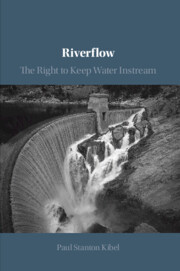Book contents
- Riverflow
- Riverflow
- Copyright page
- Epigraph
- Contents
- Maps
- Foreword: Marching Away from Folly
- Acknowledgments
- Introduction Publicum Ius Aquae
- 1 Instream Rights and the Public Trust
- 2 Instream Rights and Unreasonable Use
- 3 Instream Rights and Dams
- 4 Instream Rights and Watershed Governance
- 5 Instream Rights as Federal Law Recedes
- 6 Instream Rights as Water Temperatures Rise
- 7 Instream Rights as Sea Levels Rise
- 8 Instream Rights and Groundwater Extraction
- 9 Instream Rights and Old Canals
- 10 Instream Rights and Water as an Investment
- 11 Instream Rights and International Law
- 12 Instream Rights and Irrigation Subsidies
- 13 Instream Rights and Pacific Salmon
- 14 Instream Rights and Hatchery Fish
- 15 Instream Rights as Indigenous Rights
- Conclusion Policy Disconnected from Science
- About the Author
- Index
Conclusion - Policy Disconnected from Science
Published online by Cambridge University Press: 18 February 2021
- Riverflow
- Riverflow
- Copyright page
- Epigraph
- Contents
- Maps
- Foreword: Marching Away from Folly
- Acknowledgments
- Introduction Publicum Ius Aquae
- 1 Instream Rights and the Public Trust
- 2 Instream Rights and Unreasonable Use
- 3 Instream Rights and Dams
- 4 Instream Rights and Watershed Governance
- 5 Instream Rights as Federal Law Recedes
- 6 Instream Rights as Water Temperatures Rise
- 7 Instream Rights as Sea Levels Rise
- 8 Instream Rights and Groundwater Extraction
- 9 Instream Rights and Old Canals
- 10 Instream Rights and Water as an Investment
- 11 Instream Rights and International Law
- 12 Instream Rights and Irrigation Subsidies
- 13 Instream Rights and Pacific Salmon
- 14 Instream Rights and Hatchery Fish
- 15 Instream Rights as Indigenous Rights
- Conclusion Policy Disconnected from Science
- About the Author
- Index
Summary
In Chapter 13 on Instream Rights and Pacific Salmon, we saw how lingering adherence to the “replacement assumption” has resulted in a reoccurring tendency of the Pacific Salmon Commission to issue inaccurate abundance forecasts. That is, notwithstanding the scientific consensus that salmon hatcheries are contributing to the decline of salmon stocks, the Pacific Salmon Commission has continued to look to the volume of hatchery releases as a predictor of salmon abundance. And in Chapter 14, on Instream Rights and Fish Hatcheries, we saw how there are now proposals to apply the “replacement assumption” to delta smelt stocks despite scientific consensus that supplementation with hatchery fish is likely to damage rather than restore wild delta smelt stocks.
The reasons for this disconnect in abundance forecasting with salmon can most likely be explained by the influence of those whose economic self-interest is most at risk by acknowledging the replacement assumption is incorrect – those who rely on hydropower and diverted water from the onstream dams located upriver of the salmon hatcheries, and those employed by the salmon hatcheries. An admission that the restoration of salmon stocks requires more fish passage and instream flows, rather than more hatcheries, would challenge existing policies regarding dams, high levels of out-of-stream diversions, and hatchery operations.
- Type
- Chapter
- Information
- RiverflowThe Right to Keep Water Instream, pp. 275 - 279Publisher: Cambridge University PressPrint publication year: 2021



